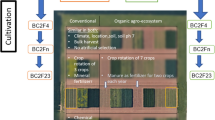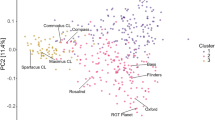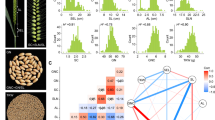Abstract
The prediction accuracy of multi-environment prediction models can be affected by the complexity of the genotype by environment interaction (G×E). Moreover, depending on the trait genetic architecture, accounting for non-additive effects, such as dominance effects, may increase the prediction accuracy of genomic models. Hence, we aimed to verify empirically: (i) the impact of the genotype by environment complexity on the prediction accuracy of grain yield in maize hybrids; (ii) the advantage of dominance effects modeling for the prediction of maize hybrids in multi-environment trials; (iii) how parent information impacts on the prediction accuracy of hybrids in multi-environment genomic models. We used a dataset comprising 614 maize hybrids evaluated during two growing seasons, under two nitrogens regimes at two locations in Brazil. The prediction accuracies were obtained using four different validation systems (hybrids and half-sib families based sampling). Our results suggest that sampling entire half-sib families or individual hybrids can achieve similar accuracy estimates in multi-environment prediction models. Moreover, modeling dominance deviations in a multi-environment prediction model can significantly increase the prediction accuracy, mainly under high G×E complexity. Also, we found a linear relationship between prediction accuracy and G×E complexity. Furthermore, we observed significant increases in prediction accuracy of lowly correlated environments when information of a linking trial/environment was included in the prediction model.





Similar content being viewed by others
Data archiving
The phenotypic and genotypic data for the maize hybrids included in this study can be found at Mendeley (https://data.mendeley.com/datasets/fvwnvrbx2y/1). We provided the adjusted phenotypes of 614 hybrids by evaluated scenarios, and the additive and dominance kinship matrices.
References
Acosta-Pech R, Crossa J, de los Campos G et al (2017) Genomic models with genotype × environment interaction for predicting hybrid performance: an application in maize hybrids. Theor Appl Genet 130:1431–1440. https://doi.org/10.1007/s00122-017-2898-0
Albrecht T, Wimmer V, Auinger H-J et al (2011) Genome-based prediction of testcross values in maize. Theor Appl Genet 123:339–350. https://doi.org/10.1007/s00122-011-1587-7
Almeida Filho JE, Guimarães JFR, e Silva FF et al (2016) The contribution of dominance to phenotype prediction in a pine breeding and simulated population. Heredity (Edinb) 117:33–41. https://doi.org/10.1038/hdy.2016.23
Alves FC, Granato ÍSC, Galli G et al (2019) Bayesian analysis and prediction of hybrid performance. Plant Methods 15:14. https://doi.org/10.1186/s13007-019-0388-x
Bernardo R (2010) Breeding for quantitative traits, 2nd edn. Stemma Press, Woodbury
Browning BL, Browning SR (2016) Genotype imputation with millions of reference samples. Am J Hum Genet 98:116–126. https://doi.org/10.1016/j.ajhg.2015.11.020
Burgueño J, de los Campos G, Weigel K, Crossa J (2012) Genomic prediction of breeding values when modeling genotype × environment interaction using pedigree and dense molecular markers. Crop Sci 52:707. https://doi.org/10.2135/cropsci2011.06.0299
Crossa J (2012) From genotype × environment interaction to gene × environment interaction. Curr Genomics 13:225–244. https://doi.org/10.2174/138920212800543066
Crossa J, Cornelius PL (1997) Sites regression and shifted multiplicative model clustering of cultivar trial sites under heterogeneity of error variances. Crop Sci 37:406–415. https://doi.org/10.2135/cropsci1997.0011183X003700020017x
Crossa J, De Los CG, Maccaferri M et al (2016) Extending the marker × environment interaction model for genomic-enabled prediction and genome-wide association analysis in durum wheat. Crop Sci 56:2193–2209. https://doi.org/10.2135/cropsci2015.04.0260
Crossa J, Pérez-Rodríguez P, Cuevas J et al (2017) Genomic selection in plant breeding: methods, models, and perspectives. Trends Plant Sci 22:961–975. https://doi.org/10.1016/j.tplants.2017.08.011
Cuevas J, Crossa J, Soberanis V et al (2016) Genomic Prediction of Genotype × Environment Interaction Kernel Regression Models. Plant Genome 9. https://doi.org/10.3835/plantgenome2016.03.0024
Damesa TM, Hartung J, Gowda M et al (2019) Comparison of weighted and unweighted stage-wise analysis for genome-wide association studies and genomic selection. Crop Sci 59:2572–2584. https://doi.org/10.2135/cropsci2019.04.0209
de Mendonça LF, Granato ÍSC, Alves FC et al (2017) Accuracy and simultaneous selection gains for N-stress tolerance and N-use efficiency in maize tropical lines. Sci Agric 74:481–488. https://doi.org/10.1590/1678-992x-2016-0313
Dhillon BS, Gurrath PA, Zimmer E et al (1990) Analysis of diallel crosses of maize for variation and covariation in agronomic traits at silage and grain harvests. Maydica 35:297–302
Dias KODG, Gezan SA, Guimarães CT et al (2018) Improving accuracies of genomic predictions for drought tolerance in maize by joint modeling of additive and dominance effects in multi-environment trials. Heredity (Edinb) 121:24–37. https://doi.org/10.1038/s41437-018-0053-6
Dumble S (2017) GGEBiplots: GGE Biplots with “ggplot2.” R Packag version 011
Federer WT (1961) Augmented designs with one-way elimination of heterogeneity. Biometrics 17:447–473. https://doi.org/10.2307/2527837
Ferrão LFV, Marinho CD, Munoz PR, Resende MFR Jr (2020) Improvement of predictive ability in maize hybrids by including dominance effects and marker × environment models. Crop Sci. https://doi.org/10.1002/csc2.20096
Fritsche-Neto R, Akdemir D, Jannink J-L (2018) Accuracy of genomic selection to predict maize single-crosses obtained through different mating designs. Theor Appl Genet. https://doi.org/10.1007/s00122-018-3068-8
Gauch HG (2006) Statistical analysis of yield trials by AMMI and GGE. Crop Sci 46:1488–1500
Goddard M (2009) Genomic selection: prediction of accuracy and maximisation of long term response. Genetica 136:245–257. https://doi.org/10.1007/s10709-008-9308-0
Heidaritabar M, Wolc A, Arango J et al (2016) Impact of fitting dominance and additive effects on accuracy of genomic prediction of breeding values in layers. J Anim Breed Genet 133:334–346. https://doi.org/10.1111/jbg.12225
Heslot N, Akdemir D, Sorrells ME, Jannink JL (2014) Integrating environmental covariates and crop modeling into the genomic selection framework to predict genotype by environment interactions. Theor Appl Genet 127:1–18
Heslot N, Jannink J, Sorrells ME (2015) Perspectives for genomic selection applications and research in plants. Crop Sci 55:1–30. https://doi.org/10.2135/cropsci2014.03.0249
Jarquín D, Crossa J, Lacaze X et al (2014) A reaction norm model for genomic selection using high-dimensional genomic and environmental data. Theor Appl Genet 127:595–607. https://doi.org/10.1007/s00122-013-2243-1
Kadam DC, Potts SM, Bohn MO et al (2016) Genomic prediction of single crosses in the early stages of a maize hybrid breeding pipeline. G3:Genes|Genomes|Genetics 6:3443–3453. https://doi.org/10.1534/g3.116.031286
Lado B, Barrios PG, Quincke M et al (2016) Modeling genotype × Environment interaction for genomic selection with unbalanced data from a wheat breeding program. Crop Sci 56:2165–2179. https://doi.org/10.2135/cropsci2015.04.0207
Lenth R (2021) emmeans: Estimated Marginal Means, aka Least-Squares Means. R package version 1.5.4. https://CRAN.R-project.org/package=emmeans
Liu G, Zhang Z, Zhu H et al (2008) Detection of QTLs with additive effects and additive-by-environment interaction effects on panicle number in rice (Oryza sativa L.) with single-segment substitution lines. Theor Appl Genet 116:923–931. https://doi.org/10.1007/s00122-008-0724-4
Lopez-Cruz M, Crossa J, Bonnett D et al (2015) Increased prediction accuracy in wheat breeding trials using a marker × environment interaction genomic selection model. G3 Genes|Genomes|Genetics 5:569–582. https://doi.org/10.1534/g3.114.016097
Melchinger AE (1999) Genetic diversity and heterosis. In: Coors J, Pandey S (eds) The genetics and exploitation of heterosis in crops. American Society of Agronomy, Crop Science Society of America and Soil Science Society of America, Madson, pp 99–118
Meuwissen TH, Hayes BJ, Goddard ME (2001) Prediction of total genetic value using genome-wide dense marker maps. Genetics 157:1819–1829
Moehring J, Williams ER, Piepho HP (2014) Efficiency of augmented p-rep designs in multi-environmental trials. Theor Appl Genet 127:1049–1060. https://doi.org/10.1007/s00122-014-2278-y
Pérez-Rodríguez P, de los Campos G (2014) Genome-wide regression and prediction with the BGLR statistical package. Genetics 198:483–495. https://doi.org/10.1534/genetics.114.164442
Saint Pierre C, Burgueño J, Crossa J et al (2016) Genomic prediction models for grain yield of spring bread wheat in diverse agro-ecological zones. Sci Rep 6:1–11. https://doi.org/10.1038/srep27312
Shang L, Liang Q, Wang Y et al (2016) Epistasis together with partial dominance, over-dominance and QTL by environment interactions contribute to yield heterosis in upland cotton. Theor Appl Genet 129:1429–1446. https://doi.org/10.1007/s00122-016-2714-2
Sousa MB e, Cuevas J, Couto EG de O et al (2017) Genomic-enabled prediction in maize using kernel models with genotype x environment interaction. G3 Genes|Genomes|Genetics 7:1995–2014. https://doi.org/10.1534/g3.117.042341
Technow F, Riedelsheimer C, Schrag TA, Melchinger AE (2012) Genomic prediction of hybrid performance in maize with models incorporating dominance and population specific marker effects. Theor Appl Genet 125:1181–1194. https://doi.org/10.1007/s00122-012-1905-8
Technow F, Schrag TA, Schipprack W et al (2014) Genome properties and prospects of genomic prediction of hybrid performance in a breeding program of maize. Genetics 197:1343–1355. https://doi.org/10.1534/genetics.114.165860
Unterseer S, Bauer E, Haberer G et al (2014) A powerful tool for genome analysis in maize: development and evaluation of the high density 600 k SNP genotyping array. BMC Genomics 15:823. https://doi.org/10.1186/1471-2164-15-823
Varona L, Legarra A, Toro MA, Vitezica ZG (2018) Non-additive effects in genomic selection. Front Genet 9. https://doi.org/10.3389/fgene.2018.00078
Vencovsky R, Barriga P (1992) Genetica biometrica no fitomelhoramento, 1st edn. Revista Brasileira de Genetica, Ribeirão Preto
Vitezica ZG, Varona L, Legarra A (2013) On the additive and dominant variance and covariance of individuals within the genomic selection scope. Genetics 195:1223–1230. https://doi.org/10.1534/genetics.113.155176
Wimmer V, Albrecht T, Auinger H-J, Schön C-C (2012) synbreed: a framework for the analysis of genomic prediction data using R. Bioinformatics 28:2086–2087
Windhausen VS, Atlin GN, Hickey JM, et al (2012) Effectiveness of genomic prediction of maize hybrid performance in different breeding populations and environments. G3 Genes|Genomes|Genetics 2:1427–1436. https://doi.org/10.1534/g3.112.003699
Yan W (2001) GGEbiplot—a windows application for graphical analysis of multienvironment trial data and other types of two-way data. Agron J 93:1111–1118. https://doi.org/10.2134/agronj2001.9351111x
Zhang X, Pérez-Rodríguez P, Semagn K et al (2014) Genomic prediction in biparental tropical maize populations in water-stressed and well-watered environments using low-density and GBS SNPs. Heredity (Edinb) 114:291–299. https://doi.org/10.1038/hdy.2014.99
Zhao Y, Li Z, Liu G et al (2015) Genome-based establishment of a high-yielding heterotic pattern for hybrid wheat breeding. Proc Natl Acad Sci 112:201514547. https://doi.org/10.1073/pnas.1514547112
Zheng X, Levine D, Shen J et al (2012) A high-performance computing toolset for relatedness and principal component analysis of SNP data. Bioinformatics 28:3326–3328
Acknowledgements
This project was supported by FAPESP (Process: 2013/24135-2), Coordination for the Improvement of Higher Level Personnel (CAPES), and the National Council for Scientific and Technological Development (CNPq).
Author information
Authors and Affiliations
Contributions
FCA elaborated the hypothesis, conducted the analyses, interpreted the results, and wrote the manuscript. FCA, GG, FIM, MSV, and JSM collected the phenotypic data. GG, FIM, MSV, and JSM contributed to the writing, mainly discussion. RFN jointly elaborated the hypothesis with FCA, contributing to ideas, graphs, and analyses. All authors read and approved the final manuscript.
Corresponding author
Ethics declarations
Conflict of interest
The authors declare no conflict of interest.
Additional information
Publisher's Note
Springer Nature remains neutral with regard to jurisdictional claims in published maps and institutional affiliations.
Supplementary Information
Below is the link to the electronic supplementary material.
Rights and permissions
About this article
Cite this article
Alves, F.C., Galli, G., Matias, F.I. et al. Impact of the complexity of genotype by environment and dominance modeling on the predictive accuracy of maize hybrids in multi-environment prediction models. Euphytica 217, 37 (2021). https://doi.org/10.1007/s10681-021-02779-y
Received:
Accepted:
Published:
DOI: https://doi.org/10.1007/s10681-021-02779-y




